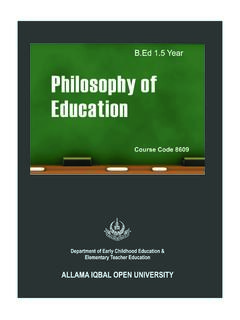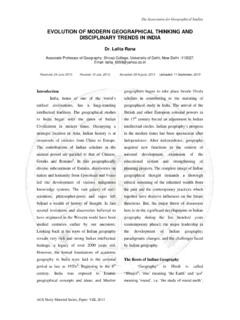Transcription of Meaning and Scope of Philosophy, Functions of Philosophy ...
1 EDUC 101: UNIT I Philosophy AND EDUCATION 9419021657 Meaning and Scope of Philosophy , Functions of Philosophy , Meaning and Scope of Education, Relationship of Education & Philosophy Need for the Philosophical foundations of Education Progress of human civilization is the product of education, but the answer to every educational question is ultimately influenced by our Philosophy of life. Philosophy against us with values in life and education tells us how these values can he realised, thus Philosophy and education are closely inter-related with each other, therefore, this chapter is devoted to bring to light some aspects of Philosophy which may be termed as foundations or basis of education.
2 Meaning and Definition of Philosophy A beginner in Philosophy is perturbed to find that different philosophers have given different definitions of Philosophy . some philosophers have laid emphasis on psychological facts, others have given more importance to values. According to John Dewey, "Whenever Philosophy has been taken seriously, it has always been assumed that it signified achieving a wisdom that would influence the conduct of life." On the other hand, according to Windelband, Philosophy is ".. the critical science of universal values." While there is much difference in Indian and western definitions of Philosophy , one finds widely different definitions presented by western philosophers also. Of these definitions, some emphasize the critical aspect of Philosophy while others lay emphasis upon its synthetic aspect.
3 Some examples of these two types of definitions of Philosophy are as follows: (a) Philosophy is a critical method of approaching experience. Examples of this type of definitions are as follows: " Philosophy is essentially a spirit or method of approaching experience rather than a body of conclusions about experience." Edgar S. Brightman "If is not the specific content of the conclusions, but the spirit and method by which they are reached, which entitles them to be described as " Clifford Barrat "Were I limited to one line for my answer to it, I should say that Philosophy is general theory of criticism." Ducasse (b) Philosophy is comprehensive synthetic science The following definitions of Philosophy emphasize its synthetic aspect: " Philosophy , like science, consists of theories of insights arrived at as a result of systematic reflection.
4 " Joseph A. Leighton " Philosophy is concerned with everything as a universal science." Herbert Spencer "Our subject is a collection of science, such as theory of knowledge, logic, cosmology, ethics and aesthetics, as well as a unified survey." Roy Wood Sellars The above mentioned definitions of Philosophy show that while some philosophers have mainly emphasized critical Philosophy , others have defined it as a synthetic discipline. In fact both these view-points are one-sided because Philosophy is both critical as well as synthetic. Literally speaking, the word ' Philosophy ' involves two Greek words Philo Meaning love and Sophia Meaning knowledge. Thus literally speaking, Philosophy means love of wisdom. It should be noted here that this definition of Philosophy is different from the sense in which the word 'Darshan' has been taken in India.
5 The literal Meaning of Philosophy shows that the philosopher is constantly and everywhere engaged in the search for truth. He does not bother so much to arrive at final conclusions and continues with his search for truth throughout his life. His aim is the pursuit of truth rather than its possession. Those who enjoy journey do not care so much about the destination, neither are they perturbed when the destination is lost in sight in spite of continued long journey. In an effort to define Philosophy , one arrives at the difficulty that there is no genus in this case and also no differentia. In defining a science one points out to the genus science and also to the particular area of the particular science which differentiates it from others.
6 This is however, not possible in the case of Philosophy because Philosophy is one and not many. Hence in order to arrive at the Meaning of Philosophy you will have to discuss its problems, attitude, method, process, conclusions and results. In brief, Philosophy is a philosophical process of solving some characteristic problems through characteristic methods, from a characteristic attitude and arriving at characteristic conclusions and results. Some might find this definition very vague and inadequate. Therefore, what is vague and inadequate if we say that in order to understand Philosophy one must understand the attitude, problems, activity, and conclusion and results peculiar to it? This will also clarify the distinctions between Philosophy and science which has been forgotten by many philosophers.
7 Branches of Philosophy While studying the philosophical thoughts of a philosopher, we study his thinking in different branches of Philosophy . These branches of Philosophy are as follows: Epistemology. Philosophy is the search for knowledge. This search is critical. Hence, the first problem which arises before a philosopher is about the nature of knowledge and its limitations. Therefore, epistemology is the most fundamental branch of Philosophy . It discusses philosophically truth, falsehood, validity of knowledge, limits of knowledge and nature of knowledge, knower and known etc. Metaphysics. This is the study of existence, reality or essence. Its main branches are as follows: (i) Cosmogony. This is a study of creation. Is the world created, or is it eternal?
8 How was world created? Why was it created? Who created the world? What is the purpose in creation? All these are the problems of cosmogony. (ii) Cosmology. The main problems of cosmology are: Is the world one or it many, or is it both one and many? (iii) Ontology. Ontology is the study of ultimate reality. Is the reality one or is it many or is it both one and many? If reality is many, what is the relation between these many elements? All these are ontological questions. (iv) Philosophy of self. This is mainly concerned with the philosophical analysis of self. What is self? What is its relation with the body? Is it free of does it depend on the body? Is it one or many? All these are problems of Philosophy of self. (v) Eschatology.
9 The discussion of the condition of soul after death, the nature of the other world, etc., form the subject matter of this branch of Philosophy . Axiology. This branch of Philosophy philosophically studies value. It has been divided into the following three branches: (i) Ethics. Ethics discusses the criteria of right and good. (ii) Aesthetics. Aesthetics discusses the nature and criteria of beauty. (iii) Logic studies truth. The subject matter of logic includes the methods of judgment, types of proposition, hypothesis, definition, comparison, division, classification and fundamental laws of thoughts, etc. Philosophy of Sciences. This branch of Philosophy is concerned with the philosophical examination of the postulates and conclusions of different sciences.
10 Philosophies of Social Science. The philosophical problems in different social sciences give birth to different branches of Philosophy of which the main are as follows: (i) Philosophies of education. This is concerned with the aim of education and the basic philosophical problems arising in the field of education. (ii) Social Philosophy . This branch of Philosophy discusses the philosophical basis of social processes and social institutions. (iii) Political Philosophy . This branch of Philosophy is concerned with the forms of government, forms of state and other basic problems arising in the political field. (iv) Philosophy of history. The subject matter of this branch of Philosophy is the nature of historical process, its purpose and its relations with the cosmic process.


















